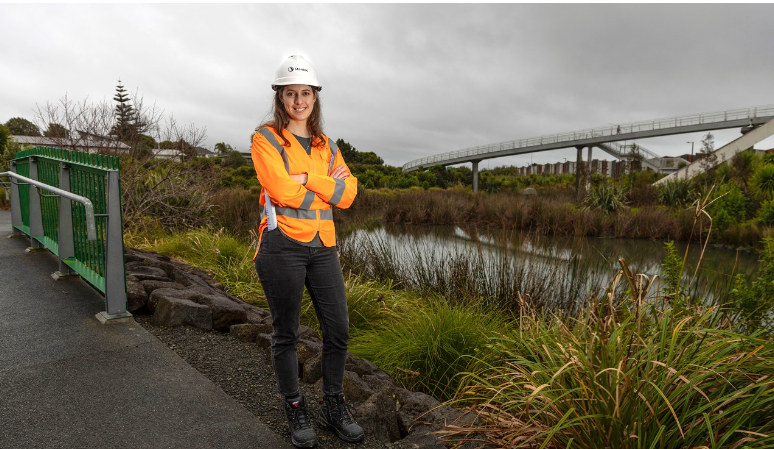Inside ANZ
Engineering a successful career
“It doesn’t just have to be boys who like maths and computers that go into engineering – it’s actually anyone with a passion.”

Environmental Engineer Ashleigh Denize at Auckland's Te Auaunga - Oakley Creek.
When Ashleigh Denize was in high school, her career advisor told her to stay away from subjects like biology and chemistry as they would limit her job prospects.
Now she’s spreading her wings as an environmental engineer for one of the world’s largest civil engineering consultancies.
“I don’t like being told what to do – as my mum knows well – so I took every science class I could,” Ashleigh laughs.
Ashleigh and I recently had a conversation as part of ANZ’s Watch Women Win project, aiming to recognise and showcase female talent and inspire women to succeed in their chosen field.
It’s often said celebrating another person’s success will never rob you of your own. If we want to accelerate change, we need to celebrate achievements, shine a light on positivity and tell these stories – often and proudly.
Women are typically under-represented in STEM fields – Science, Technology, Engineering and Mathematics. In Ashleigh’s first year studying engineering at university, just 10 of the 120-or-so students were women.
“Civil, mechanical, robotics and computer engineering are traditionally male-dominated fields – and while I think people see engineers as being men – outside, hammer in hand and a hard hat on their head – the reality is that anyone can do anything,” Ashleigh said.

Ashleigh Denize and Antonia Watson
It’s a scenario I’ve been all too familiar with over the course of my career. Although the number of female leaders in banking, and within ANZ, is increasing.
Female leaders shouldn’t have to compromise who they are to fit in with the traditional, male-dominated view of how leaders should act.
I’m very conscious of that – of being true to myself and not turning into a dominating leader. This wouldn’t be me – just because that’s someone else’s idea of what a leader should look like.
Ashleigh has an amazing opportunity to make an impact, because she’s in an industry where there are less women.
Ashleigh also told me that, aside from the civil engineering classes at university, certain sub-sectors of engineering are attracting a growing number of women.

Environmental Engineer Ashleigh Denize at Auckland's Te Auaunga - Oakley Creek.
“Chemical and process engineering, biological engineering and environmental engineering are more appealing to women now, as well as men,” Ashleigh said.
“Attitudes are shifting to reflect that anyone, of any gender, can have a career in those roles.”
“It’s about knowing your strengths - finding the spaces you know you’re good in.”
A different approach to pipes
As an environmental engineer for Stantec, Ashleigh helps design and implement natural solutions to some of our biggest problems - like flooding.
After last year’s flood in the North Island of New Zealand, the idea of nature-based engineering has gained traction, especially as climate change threatens to increase the frequency and severity of weather events.
“With the flooding in Auckland, the reason why it was so bad downtown was that we’ve taken all the rainwater and put it into pipes underground – but we can never build a pipe big enough for all of that rain,” Ashleigh said.
“In Auckland, we’re starting to daylight the streams again – all of those that were buried are being dug up again and it becomes a community space. You can make walkways, native planting, attract wildlife and it becomes a recreational space as well as beneficial engineering.”
One example of this approach is Auckland’s Te Auaunga - Oakley Creek project. A 1.3km stretch of the stream has been transformed over the past decade, going from a flood-prone concrete channel to a large recreation area planted with native trees.
Inspiring the next generation
During her studies, Ashleigh wanted to inspire others to get into STEM fields.
“I think that starts in high school, encouraging students to do science and maths and keep up with those kinds of subjects,” Ashleigh said.
She became involved with Engineering New Zealand’s Wonder Project.
“It’s a really cool initiative – you go into schools and get them involved in engineering projects, teach them about technology and show them kinds of things you can do using technical skills.”
“We built a water bottle rocket for the primary school kids,” Ashleigh said. “Exposing them to aspects of technology in a really fun way lets them know it is an option for them.”
“It doesn’t just have to be boys who like maths and computers that go into engineering – it’s actually anyone with a passion.”
Antonia Watson is ANZ New Zealand CEO.
To find out more about the Watch Women Win project click here.
A version of this article was originally published on ANZ News New Zealand.
related articles:
Inside ANZ
A rising star who bleeds blue
Leadership
